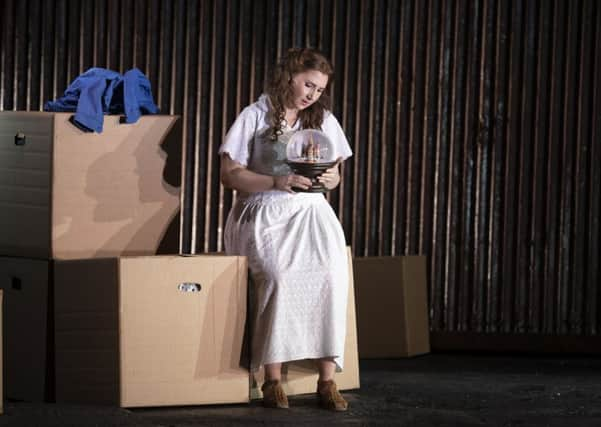Opera review: Scottish Opera: Katyá Kabanová, Theatre Royal, Glasgow


Katyá Kabanová, Theatre Royal, Glasgow ***
As the action gets going, the grey inhabitants of an isolated Soviet town (the original Russian setting is advanced to the 1970s) scuttle soul- lessly across an enormous steel bridge, like figures in a Lowry painting. Underneath, amid the reeds and mudflats of the River Volga, the human tragedy of the Katyá (Laura Wilde) unfolds. Then, at the climax of the piece, a link is inferred as Katyá hurls herself from the bridge’s rusting girders and into the waters beneath, an act of resigned escape from a suffocating community. The curtain descends; the soulless resume their disinterested existences. Life goes on.
The sense of isolation is visibly and effectively maintained in Leslie Travers’ split-screen set, the rising and tilting of the bridge allowing the emphases to wax and wane. And by and large, the storytelling is clear and consistent.
Advertisement
Hide AdAdvertisement
Hide AdWilde’s Katyá commands affection and sympathy at the hands of the mercilessly matriarchal Kabanicha, but she is almost too nice, too accepting. There was one moment in the final act of this opening performance when she opened up vocally, evoking real heartache, but too late for her ensuing death to invoke little more than a dismissive “who cares?”
Patricia Bardon is steely and thoroughly unlikeable as the icy Kabanicha, but overdoes things to the point of caricature. Pity her son Tikhon, portrayed with loathsome obeisance by Samuel Sakker. Paul Whelan’s medal-flaunting Dikoy is styled with idiot pomposity, while the love interest, Boris, offers little in the way of seduction.
All in all, the passion is strangely underplayed, except for Vanya and Varvara, whose ripe performances by Trystan Llŷr Griffiths and Hanna Hipp inject a juiciness and lust.
If the motorised energy of Janacek’s music was intended to breathe fire into this production, the performance by Scottish Opera Orchestra simply wasn’t tight and electrifying enough under Stuart Stratford’s direction, more reactive than proactive in recognising the score’s elemental bite and visceral modality as a driver of the opera.
It was the weakest element in a production that has much going for it, and which may pick up as the run matures. If that happens, then we might see a Katyá Kabanová that really sings. - KEN WALTON